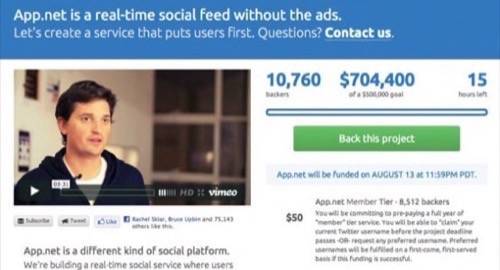
App.net, a Twitter clone with a membership fee, has been touted as a powerful, developer-friendly alternative to Twitter. Massive adoption seems unlikely. But it doesn’t mean that App.net is doomed to failure, either.
App.net, launched last month by iMeem and Picplz founder Dalton Caldwell, reached its financing goal over the weekend. As of Monday afternoon, App.net had raised more than $700,000 from more than 10,000 backers, beating its $500,000 goal by more than 40%.
That’s good news for Caldwell and App.net’s team. And with a handful of registered users and developers, and money in the bank, they can now figure out how to develop and market their service. But what does it mean for Twitter? And for the rest of us?
App.net Isn’t Going To Replace Twitter
Let’s be realistic. Twitter isn’t going anywhere just because there’s some new Twitter clone out there. (Remember the many prior purported Twitter killers?) Twitter has reached such a level of mainstream awareness and adoption that it’s not going to collapse. When was the last time you watched TV without seeing a hashtag on the screen?
Twitter is especially not vulnerable to a service like App.net that plans to charge users money to come aboard. The lesson from years of Web economics is that most people generally won’t pay for something they can get for free elsewhere, even if it means looking at a few ads.
And because social networks are exponentially more valuable as they sign up more users, a free, bigger Twitter will continue to be generally more valuable and more useful than a smaller competitor.
But App.net Could Become Useful
Because of its paywall, App.net isn’t likely to become the place where comedians, politicians, CEOs, and athletes are all hanging out with you and your friends, the way Twitter is. But that isn’t necessarily the goal.
Just as Yammer has become a valuable Twitter-like service for corporations, and Stocktwits a valuable Twitter-like service for investors, App.net could become a useful communication service for other social or professional circles.
Like who? Startup-types, perhaps? (The same early tech adopters that fueled Twitter’s initial rise?) Or maybe designers, developers, or Mac nerds. Or scholars, or models.
And because one of App.net’s selling points is its flexibility for developers, maybe some software will launch that makes App.net useful to a specific population that we can’t even imagine today. It will be near-impossible to match Twitter’s ubiquity. But App.net doesn’t have to.
(The bigger question, then, is whether App.net can eventually generate enough revenue to pay its bills. And, someday, whether it can create a return for its original investors, Andreessen Horowitz. But building its product and user base is the bigger, more immediate concern.)
Will App.net Change Twitter’s Stance Toward Developers?
Recall that part of the inspiration for App.net is the perception that Twitter is becoming increasingly hostile toward developers, discouraging them from creating Twitter clients and taking away features that allow things like Instagram’s ability to let you find your Twitter friends on Instagram. Might App.net’s funding success change Twitter’s strategy?
Not likely.
Again, because Twitter is so far ahead of App.net and all the other Twitteresque services in size and value, Twitter will continue to do what it thinks is best for itself with minimal influence from outside voices.
Perhaps if there’s a successful feature or service from App.net, Twitter will copy or integrate it, the way it did with TwitPic (photos) or StockTwits (stock tickers in tweets). But just because a service like App.net signs up 10,000 people over a few weeks, that’s unlikely to set off any alarm bells at Twitter. Twitter probably signs up 10,000 new users every few hours.
Twitter’s big-picture focus these days is remaining an independent company, and that requires building a multi-billion-dollar business. So far, it has set its sights on advertising, which rewards huge scale and tight control over users. And until that either succeeds or fails miserably, that’s what Twitter is likely to use as its guide in making decisions. Not a tiny upstart with a self-limiting growth model.
















